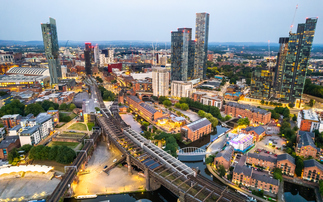Energy efficient buildings can also boost health, wellbeing and productivity, say experts during BusinessGreen webinar in association with Rockwool
The building sector is rapidly becoming more energy efficient in response to legislation and corporate demands for better performing offices. However, while improvements such as better insulation, double glazing, and more efficient boilers have long been shown to generate savings for the companies and homeowners who install them, the 'softer benefits' tend to be overlooked.
Research suggests building measures such as greater exposure to day light, fresh air and plants can have marked effects on office workers in terms of growing productivity, minimising sick days, and boosting general wellbeing. And in the domestic sector, the UK's recently introduced £3m 'boiler on prescription' scheme, allowing doctors to decide whether patients' homes need better insulation or other improvements for the good of their health, is showing early signs of reducing the £1.5bn cold weather costs the NHS faces each year.
BusinessGreen's latest webinar, in association with Rockwool, entitled ‘How healthy is your building, home or office? Understanding the hidden benefits of green buildings', sought to explore these issues with a panel of experts from across the sustainable building sector.
Challenge of commercial
Mallory Taub, wellbeing and sustainability specialist at Arup Associates, cited research by the World Green Business Council that found 90 per cent of a business' operating costs have to do with staff costs, while energy costs typically represent about one per cent.
"People spend about 90 per cent of their lives inside, at least in cultures like ours, so it seems the opportunity for impact is really large," she said. "Incentives or programmes or initiatives that really create benefits for the employees or occupant from a financial point of view can make a really large impact overall on the organisation."
Taub added that greener buildings have the potential to be healthier too, and that company initiatives could "substantially" lower the 113 million days lost to sick leave in the UK each year.
For example, technologies and policies that improve air quality, ensure noise levels are appropriate to different areas of the office, address the quality of lighting rather than just its energy consumption, and take steps to improve the food that comes into the office all help to boost health and well-being.
Taub suggested owners need to work with occupants to examine how buildings can feed into the organisation's wider sustainability policies and strategy. Using staff surveys alongside smart metering and other monitoring systems allows owners to keep informed about the state of the building and what improvements are most needed.
"We think that when done right these spaces could help promote better sleep, comfort, mental acuity, nutrition and overall health," she said. "This could ultimately lead to increased productivity, reduced time employees are out of the office sick, but also making the time in the office just a little bit nice. It could also be part of helping to recruit and retain talent and inspiring long-term healthy habits."
Warmer homes
Nigel Banks, group sustainability director at social housing specialist Keepmoat, set out a similar story for the residential sector, outlining the declining resistance to respiratory diseases and raised blood pressure that are typical of living in cold homes. A&E departments have plans of action to deal with cold days, expecting a raised level of heart attacks two days after a cold snap, with more stokes likely a couple days further on and respiratory problems after that.
"This has real, visible and direct consequences on the NHS," he added. "It takes up to 40 days [after a cold day] for the number of deaths the NHS sees to return to normal."
But while in the UK there are 25,000 to 30,000 excess deaths due to cold weather in the winter, about 1,000 people also die due to overheating in the summer, Banks said. Heatwaves similar to 2003, which killed 2,000 in the UK and 30,000 across Europe, are likely to become more frequent as the climate changes, so builders need to start designing buildings to cope, using techniques such as shading, ventilation, and orienting houses so they do not overheat, at the same time as tackling cold homes through better insulation.
Preliminary results from a Keepmoat scheme in Oldham support Banks' insistence that we already have the solutions to deliver comfortable, healthy, and energy efficient homes. The Warm Homes Oldham Service has been set up to help local people who struggle to afford to heat their home and Banks said it has so far seen an almost 30 per cent reduction in A&E admissions.
"We've done this and it absolutely works," he added. "There are the technical solutions out there that are cost-effective to insulate and deal with overheating and air quality."
In practice
Earlier, Emma Pinchbeck, head of climate and energy at WWF-UK, had outlined the benefits of the green technologies used in the organisation's new Surrey HQ. The Living Planet Centre is rated 'Outstanding' by energy efficiency rating system BREEAM and features all manner of green technologies, ranging from a heat pump under the foundations to solar panels on the roof, as well as an extensive use of recycled and sustainable materials and close links to public transport. The site also has an auditorium and education centre to inspire others to embrace green building best practices.
"The building is designed to be cutting edge rather than bleeding edge - this should be something that is replicable for many other commercial organisations out there," she said. "By moving to a more efficient, better run business space we are saving money day in, day out. But we are also able to work more flexibly due to the open space and the light [and] the levels of staff satisfaction are through the roof compared to where they were with our old HQ."
However, despite the benefits outlined, a poll of viewers taken during the webinar found around a third worked for organisations that had no sustainable buildings policy, while 40 per cent of organisations have a policy in place but one that only focuses on energy efficiency.
Need for action
The panellists agreed that with the frequency of extreme weather events likely to increase as the climate changes, building owners need to act now to future-proof their property at the same time as taking steps ti curb energy use.
"We should be looking to design more resilient buildings, but simply taking action now is making current buildings more resilient," Pinchbeck said. "It's far more cost-effective to go the extra mile today than it will be to do it all again in future."
Banks added that the new UK government will have to play an important role in setting standards and driving retrofits. "We really do need some strong policy in this area," he said. "We've called for domestic energy efficiency to be an infrastructure priority. We'll push that with the new government, because when you actually see the personal impacts they are significant."
Further research is likely to clarify the wider benefits of sustainable buildings, but clearly there are plenty of reasons for businesses to invest in improving their workspace over and above the emissions and energy bill savings that result from greener properties.
You can catch up with the webinar here and join the debate using the hashtag #healthybuilding









